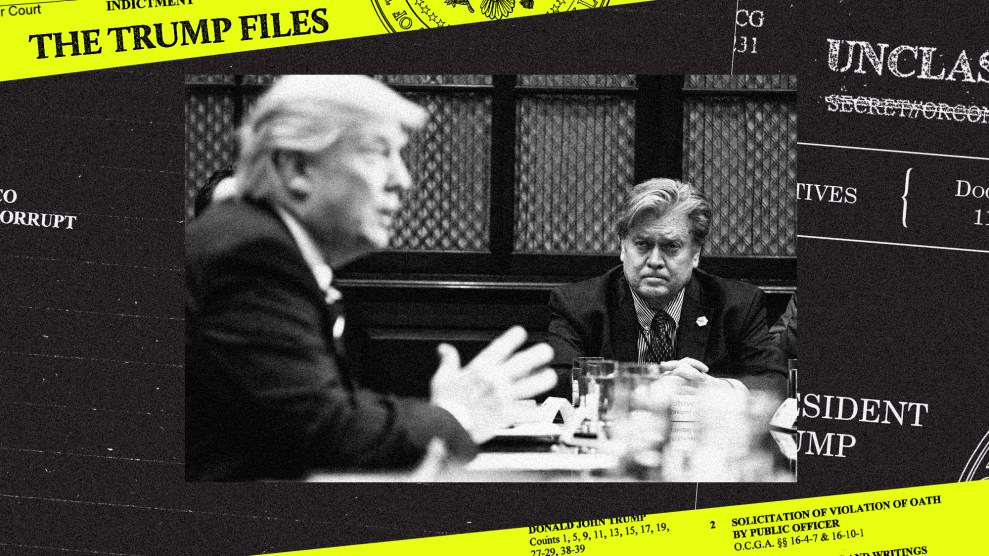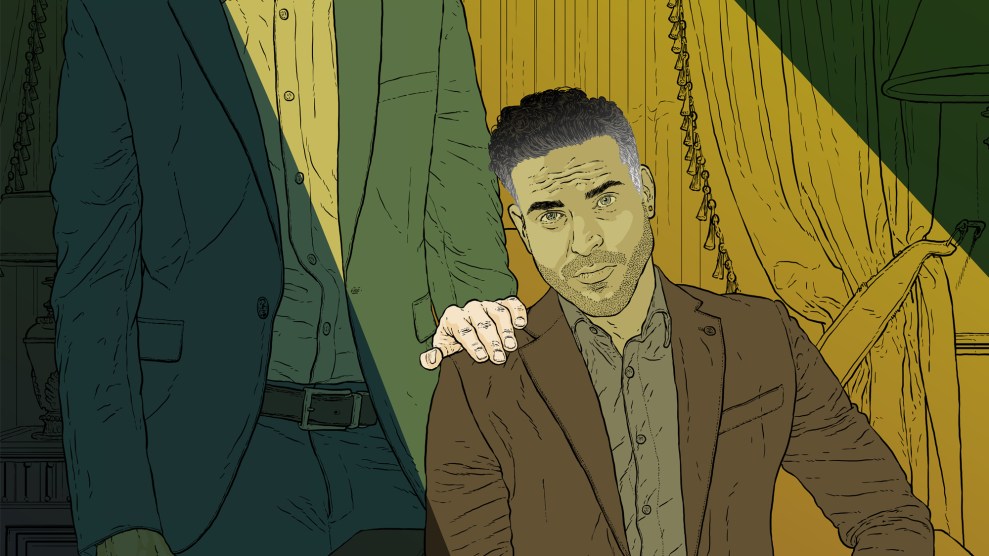
Mother Jones illustration; Evan Vucci/AP
As Donald Trump campaigns to be a dictator for one day, he’s asking: “Are you better off now than you were when I was president?” Great question! To help answer it, our Trump Files series is delving into consequential events from the 45th president’s time in office that Americans might have forgotten—or wish they had.
Steve Bannon was indicted in 2020 for allegedly helping defraud Donald Trump fans who donated to a nonprofit that promised to privately fund a border wall. The other defendants in the plot went to prison. But in the final hours of his presidency, Trump pardoned Bannon, reportedly over the objections of various advisers, due to what the Washington Post described as Bannon’s “vociferous support” for Trump’s efforts to steal the 2020 election.
Trump doled out pardons and commutations throughout his presidency, culminating in a deluge of clemency during his final weeks office. He pardoned service members accused of war crimes whose cases were promoted on Fox News; Lil Wayne; most of the Republican congressmen convicted of federal felonies this century; the ex-husband of an unctuous Fox News host; and a former Dick Cheney aide whose pardon might irk former FBI chief James Comey. He even pardoned some people who probably deserved it.
But many of his pardons, like the one he gave Bannon, were clearly corrupt—a misuse of power to benefit his supporters and please his allies. Trump may have acted legally in exercising his constitutional pardon power, but that doesn’t make his actions any more defensible. He granted pardons in apparent exchange for political support, to campaign donors, and to clients of lawyers charging small fortunes for access to him. He dangled the possibility pardons for potential witnesses who might testify about his campaign’s ties to Russia.
This orgy of transactional clemency was a preview of the authoritarian powers Trump has promised to wield without restraint in a second term. Trump has pledged to pardon people charged with crimes connected to January 6 and, if he wins, he’s expected to claim power to order the DOJ to drop the two federal cases against him. And he appears prepared to use his power to block federal charges against federal officials who commit alleged crimes in service of his goals.
Here is a non-complete list of some of Trump’s most outrageous pardons.
Friends and Family of Jared
Trump’s process for assessing pardon pleas in his final days in office was reportedly chaotic, with little involvement from the DOJ office tasked with assisting federal clemency efforts. Instead, Trump’s son-in-law, Jared Kushner, oversaw the process. Many people with connections to Kushner won pardons, most notably his father, real estate developer Charles Kushner, who was convicted in 2005 of crimes that included hiring a prostitute to film herself having sex with his sister’s husband, a way to punish her for cooperating in a federal investigation. Trump’s pardon announcement did not mention what role Jared may have played in helping his dad. A Kushner spokesperson did not respond to a request for comment.
Kushner-connected pardon recipients include 27 people with ties two Orthodox Jewish organizations that had worked with Kushner on criminal justice reform, the New York Times reported. Several of those hired pro-Trump attorney Alan Dershowitz, who advised Kushner on Middle East policy and represented Trump during his first impeachment trial, to help them seek pardons.
That group includes Jonathan Braun, a Staten Island man whose 10-year sentence for drug dealing Trump commuted even as Braun was under investigation for his role in a loan-sharking scheme in which the defendants were accused of repeatedly threatening violence. A federal judge fined Braun for $20 million in February. In August, Braun was arrested and charged with assaulting his wife and her 75-year old father.
Another Dershowitz client who won a commutation was Eliyahu Weinstein, who Trump freed eight years into a 24-year sentence for running a ponzi scheme. Weinstein was indicted last year for allegedly running a new, similar scheme, that prosecutors said he launched “soon after” his release.
Ken Kurson, a close friend of Kushner’s, received a pardon for charges that he had cyber-stalked and harassed three people. In 2022, Kurson pleaded guilty to cyberstalking his ex-wife.
Anyone Who Might Support Him
Trump has mostly pardoned Republicans, but he did help a few Democrats. He pardoned former Illinois Gov. Rod Blagojevich, who was convicted of attempting to sell a Senate appointment and who had appeared on “The Apprentice” in 2010. Since the pardon, Blagojevich has supported Trump. Trump in 2021 also commuted the 28-year prison sentence that former Detroit Mayor Kwame Kilpatrick received for extensive corruption. Kilpatrick is now campaigning for Trump, explaining that he is “grateful” for Trump’s help.
In 2019, Angela Stanton, who was convicted in 2004 for her role in a car theft ring and later supported Trump’s foray into criminal justice reform, appeared on a Fox News panel of Black voters as a Trump supporter. In 2020, Trump pardoned Stanton.
Alice Johnson, a woman whose decades-long sentence for cocaine distribution Trump commuted in 2018, appeared in a 2020 Trump campaign ad that aired during the Super Bowl. Johnson also spoke in support of him at during the Republican National Convention that year. Trump granted her a full pardon the next day.
Celebrities
Trump’s 2021 pardon of Lil Wayne came after the rapper, whose real name is Dwayne Carter, endorsed him (and hired a lawyer who previously had appeared on the “Apprentice” in 2004). Kodak Black, another rapper, who was freed from prison when Trump pardoned him, released a pro-Trump song in August. Trump also pardoned Casey Urlacher on charges of helping run a massive gambling ring, after meeting months earlier with Urlacher’s brother, former Chicago Bears linebacker Brian Urlacher. The former All-Pro endorsed Trump in September and cut an ad for him.
Medicare Fraudsters
Trump’s cross-aisle pardons included Salomon Melgen, a Florida eye-doctor who was a financial backer and friend of former Sen. Bob Menendez (D-N.J.). A hung jury in 2017 helped Menendez avoid conviction on charges that he did political favors for Melgen in exchange for financial benefits. (Menendez was convicted in July 2024 in a different corruption case.)
Unlike Menendez, Melgen was convicted in 2017 on 67 counts related to bilking Medicare out of at least $73 million by persuading numerous elderly patients to undergo tests and get treatment for diseases they did not have. Trump’s pardon of Melgen, which came after a request from Menendez, is one of at least five the former president granted to people convicted of defrauding Medicare or Medicaid, the Washington Post noted in March. Such pardons coexist uneasily with Trump’s claim that he would cut federal spending on those programs by cracking down on fraud.
Of particular note, Trump pardoned Philip Esformes—who had been sentenced to 20 years in prison for his role in stealing more than $1.3 billion from federal programs via fraudulent billing at nursing homes he owned—after his father gave $65,000 to a Kushner-linked charity. Esformes was recently arrested on felony charges related to domestic violence.
People With Connected Lawyers
Trump’s willingness to grant pardons created a robust market for people claiming they had the president’s ear. Former Trump lawyer John Dowd reportedly earned tens of thousands of dollars securing a pardon for a Las Vegas gambler, William Walters, sentenced to prison in 2017 for insider trading. That’s nothing compared to Matt Schlapp, the head of the American Conservative Union, who disclosed receiving $750,000 to lobby for pardon for man named Parker Petit, who was convicted in 2020 of accounting fraud—even though Petit didn’t get a pardon. Rudy Giuliani has denied multiple claims that he requested $2 million to help pardon-seekers get Trump’s attention. Bradley Birkenfeld, a man convicted of fraud in 2008, told the Atlantic in 2021 that former Trump adviser Corey Lewandowski had demanded $500,000 to meet with Trump about a pardon and $1 million more if Trump granted it. Lewandowski denied that claim.
Russia, Russia, Russia
Trump’s attraction to revenge pardons and personal interest combined in his wiliness to undo charges against those caught in investigations into his campaign’s connections to Russia.
Trump pardoned even minor figures convicted of crimes in the scandal, such as George Papadopoulos, a Trump campaign foreign policy adviser who a Trump aide dismissed in 2017 as mere “coffee boy.” Trump pardoned Paul Erickson, a marginal Republican operative best known for dating convicted Russian agent Maria Butina. In a statement at the time, Trump said Erickson’s conviction “was based off the Russian collusion hoax.” In fact, Erickson pleaded guilty to defrauding would-be real estate investors in North Dakota in a scheme unrelated to the Russian matter.
Trump pardoned longtime adviser Roger Stone, who was convicted in 2019 of lying to Congress about his role in helping Trump benefit from Democrats’ emails hacked by Russian agents. Stone was “covering up for the president” when he lied to the House Intelligence Committee, Judge Amy Jackson Berman said while sentencing him. Trump’s pardon of former national security adviser Michael Flynn similarly appeared to reward loyalty. Flynn in 2017 pleaded guilty to lying to the FBI about contacts with Russia. Just before Flynn’s plea, Dowd, the Trump lawyer, left a voicemail for a Flynn attorney in which he asked for a “heads up” if there was any “information that implicates the president.” Dowd added: “Remember what we’ve always said about the president and his feeling toward Flynn, and all that still remains.” Dowd has denied that he was dangling a pardon. Flynn later attempted to reverse his plea. And he never did implicate Trump in wrongdoing.
Nowhere did Trump use his pardon power more successfully than with Paul Manafort. As special counsel Robert Mueller’s team prosecuted Manafort over his secret lobbying for Ukraine’s former pro-Russian president and untaxed payments Manafort received, Trump “made it known that Manafort could receive a pardon,” Mueller later reported. Manafort did eventually plead guilty to some charges and signed a cooperation agreement. But prosecutors later determined he had likely lied to them. He even funneled information on the investigation to Trump’s lawyers, in an apparent effort to remain in line for the pardon Trump finally delivered in 2020.
While working for Trump’s campaign in 2016, Manafort met secretly with a suspected Russian agent to discuss winning Trump’s support for a plan to settle the conflict then occurring in eastern Ukraine by essentially handing control of the region to Moscow. It’s unclear what if anything Manafort said to Trump about this supposed peace plan at the time. But eight years later, following Russia’s full-scale invasion, Trump says he has a solution that would end the war in Ukraine immediately. His new plan sounds something like the idea Manafort discussed back in 2016.











